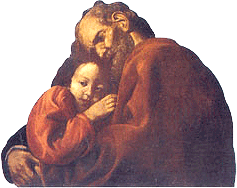
God the Father by Deborah Beach Giordano
No, Thanks!
 A couple of weeks ago John and I were in a neighborhood near where we both used to work. Since it was nearly noon, he suggested we stop for lunch at a local restaurant. It’s a lovely place with pretty furnishings, lace-edged curtains and well-tended flowers in the window boxes. It even has a cute name: “Auntie Em’s.”
A couple of weeks ago John and I were in a neighborhood near where we both used to work. Since it was nearly noon, he suggested we stop for lunch at a local restaurant. It’s a lovely place with pretty furnishings, lace-edged curtains and well-tended flowers in the window boxes. It even has a cute name: “Auntie Em’s.”
We used to go there all the time.
But as soon as John mentioned the place, I had an immediate reaction: “Oh holy cats. NO!!”
The Chicken Salad Sandwich
The problem, you see, is that the last time we ate at Auntie Em’s I had a chicken salad sandwich. It used to be my absolute favorite thing on their menu.
 But the last time I ate their chicken salad sandwich was “the last time” for a reason. About 6 hours later I was violently ill. Really, really sick. And the symptoms and their aftermath lasted for days afterwards.
But the last time I ate their chicken salad sandwich was “the last time” for a reason. About 6 hours later I was violently ill. Really, really sick. And the symptoms and their aftermath lasted for days afterwards.
If you’ve ever had food poisoning you know exactly what I mean. It was awful. Miserable. Yuck.
As I said, we’d eaten there probably 50 times before, and never with any upsets. The food always appeared fresh, was tasty, and attractively prepared. The law of averages would say: it was a fluke. A one-time deal. Nothing to worry about. But I say — and most certainly my insides say — “Oh no. Never again.”
Experiences, Perceptions, and Beliefs
We humans are creatures of perception; our reality is shaped by what we’ve experienced.
 For example, children who are bitten by dogs will often carry a terror of the animals into adulthood. They become convinced that every dog is inherently dangerous — even though logically, rationally, that can’t possibly be true.
For example, children who are bitten by dogs will often carry a terror of the animals into adulthood. They become convinced that every dog is inherently dangerous — even though logically, rationally, that can’t possibly be true.
That’s certainly my situation. Chicken salad sandwiches no longer seem safe. Just the thought of one makes me feel queasy. And my horror / fear / disgust extends beyond the boundaries of a single cafe. I can’t imagine ordering a chicken salad sandwich anywhere, ever again.
Once Bitten...
In general, the fewer experiences we’ve had, the greater the influence they have on us. That’s why our strongest prejudices (both pro and con) are often based on only a single contact — be it with sushi or Swedes, Vegemite or vegetarians, ratatouille or refrigerator repairmen.
That’s one of the confusing aspects of the Lord’s Prayer; it begins by calling God “our Father.” Most of us have extremely limited experiences of fatherhood: having had only one father, perhaps supplemented by a stepfather, and maybe a grandfather or two. But, in general, most of us base our understanding of what a father is like on a single example: our own father.
And so, when we pray to “our Father in heaven,” that image is always in the back of our minds. It’s a kind of astral projection; attributing the characteristics of our earthly father to God: just a larger, stronger, and more powerful version.
Who’s Your Daddy?

But if we had a father who was angry, vindictive, abusive, or absent, that can influence our relationship with God. We’ve had a taste of “fatherhood” — and it made us sick. We don’t want to experience that kind of thing ever again.
The challenge for us as Christians, is to discern the kind of “father figure” our Lord had in mind when he used that term. Did he understand God as a nurturing, protective, and forgiving Divine Dad; or as a stern celestial Patriarch whose rule was unbending and who would readily discipline and punish disobedient children? What was a “father” according to Jesus?
Fatherhood According to Jesus
The most well-known of the Lord’s descriptions of fatherhood comes from the parable we know as “the Prodigal Son.” In it a father waits, scanning the horizon day after day, longing for the return of his wandering child. When the young man finally comes home — dirty, impoverished, humiliated — the father rushes out to greet his son: embracing him, welcoming him, and celebrating his return. The father didn’t care about what his child had done or had failed to do. All that mattered was that they were together again.
The gospels tell us of a man, an elder of the local synagogue, who comes to Jesus and begs this young “faith healer” to cure his daughter’s illness. Unconcerned with his stature or reputation in the community — all he cares about is that his child be made well. Recognizing this fellow as his kind of “dad,” Jesus returns with Jarius to his village and restores the little girl to life (Mk 5:21-43; Lk 8:40-56; Mt 9:18-26).
 And we know that Jesus’ own earthly father, Joseph, was a man of deep compassion and kindness. Despite the rumors and gossip, regardless of how the situation looked, he married his pregnant fiancée and accepted her “illegitimate” son as his own.
And we know that Jesus’ own earthly father, Joseph, was a man of deep compassion and kindness. Despite the rumors and gossip, regardless of how the situation looked, he married his pregnant fiancée and accepted her “illegitimate” son as his own.
In the years that followed, Joseph provided for, protected, and loved the Lord — experiences that must have been instrumental in shaping Jesus’ understanding of what a father was.
A Description and a Prescription
 What Jesus offers to us in the Lord’s prayer is not only a description of God, but a prescription for fatherhood. The “prescription” works in two ways; as a remedy for past experiences of bad fathers, and as a formula for how to be a good father.
What Jesus offers to us in the Lord’s prayer is not only a description of God, but a prescription for fatherhood. The “prescription” works in two ways; as a remedy for past experiences of bad fathers, and as a formula for how to be a good father.
First: If your earthly father possessed none of the qualities of holy fatherhood, forgive him; and release the harm and hurts. Those are his debts: obligations that his soul must carry. And release him from your expectations and desires. Do not look for what you need from a dry well; rely on your heavenly Father for comfort, peace, and reassurance.
Secondly: If God is the ultimate “father figure” then we ought to model our parenting on that Divine Example. A good parent is patient, loving, kind, compassionate, and nurturing; a holy father (or mother) is one who forgives readily and loves unconditionally.

And who knows? If we were as heavenly in our parenting as Jesus taught us to be, perhaps we would raise up loving, caring, peaceful children who would raise loving, caring, peaceful children, who would, in turn, raise their children to be loving, caring, and peaceful ... and so on. In time, attitudes and interests would change. One day it might just become “on earth as it is in heaven.”
Let us work and pray to make it so!
Virtual hugs and real-time blessings,
Deborah ✝
Suggested Spiritual Exercise
What kind of father did/do you have and how has he influenced your understanding of fatherhood? How has he influenced your understanding of the term “heavenly Father”?
Disclaimer
The story you have just read is true. Only the name of the restaurant has been changed to protect the innocent. (I know of no restaurant called “Auntie Em’s.”)